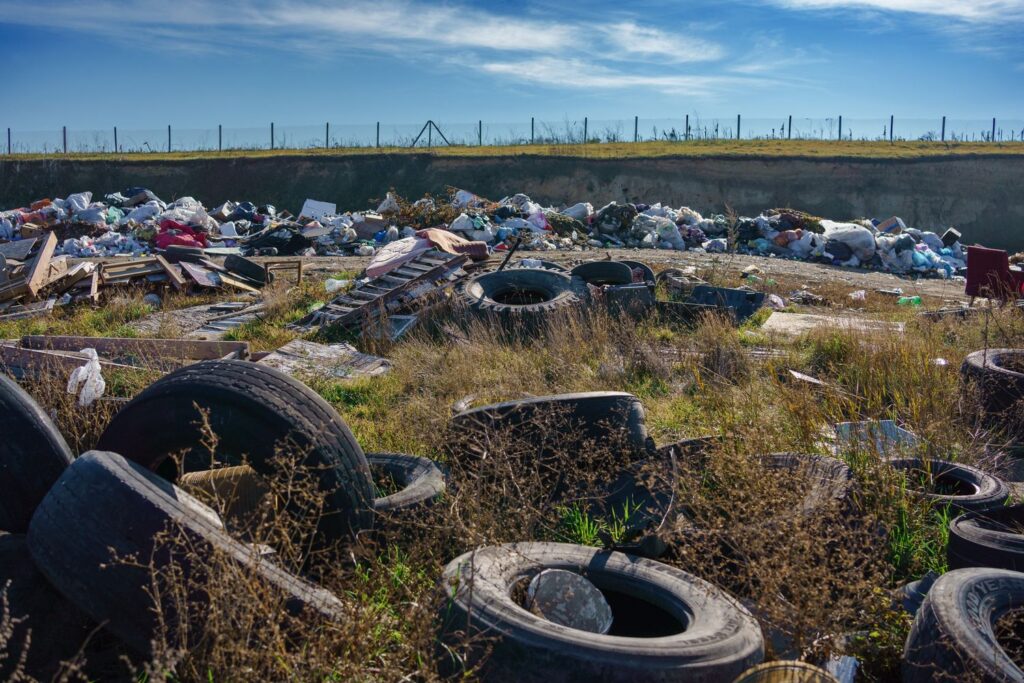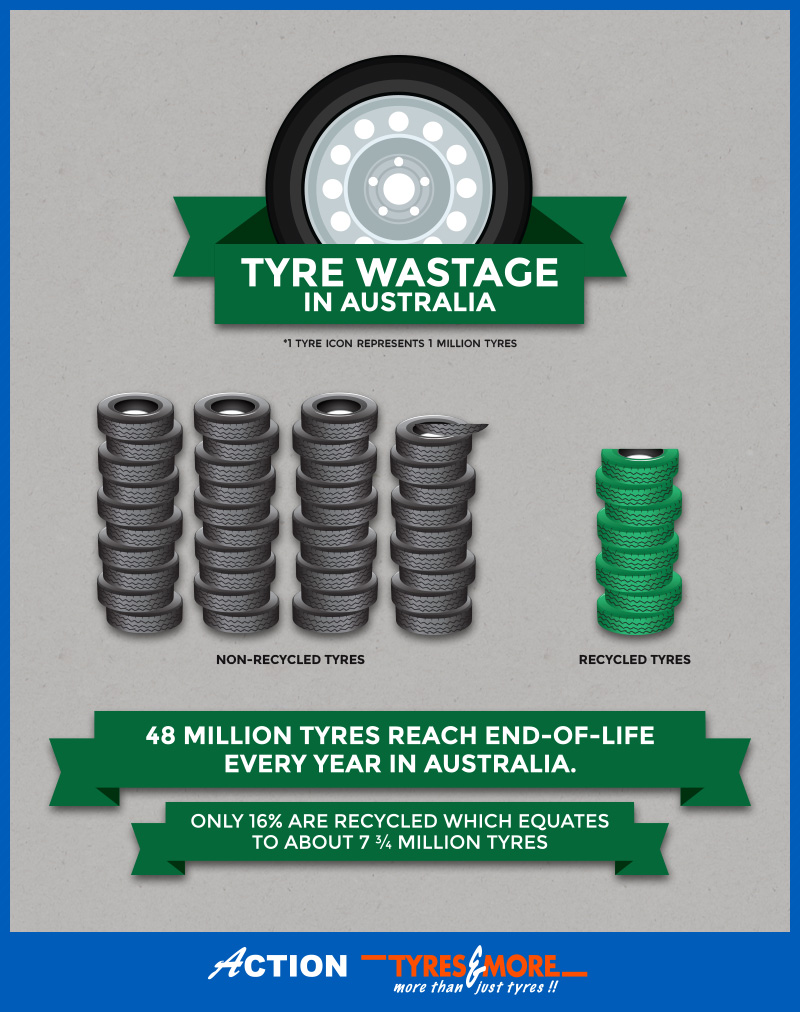Tyre Waste & Recycling Statistics Australia

Australia's tyre waste management is required to prevent environmental hazards and health threats while enhancing economic benefits through recycling. Furthermore, having viable options for disposing of tyres allows for their reuse and reduces the amount of undesired waste that goes to landfills.
This article discusses recycling methods, associated statistics and the benefits of eco-friendly disposal of tyres. Learn more about tyre waste and what measures are being taken by the government and other stakeholders to curb the hazards posed by the illegal dumping of tyres.
All Gone Rubbish Removals efficiently remove and dispose of rubbish from homes and
businesses. We ensure that littering in landscapes and waterways is prevented and energy conserved. Tyres that are disposed of improperly can cause a lot of environmental stress. Moreover, stack can create fire hazards, emitting toxic gases when burning tyres.
Deciphering the Big Tyre Waste Problem in Australia
Millions of tyres are thrown away annually in Australia, creating environmental, economic, and societal problems. In 2023, 68 million passenger car tyres were scrapped from vehicles across the country. However, the recovery rate is low, and large tyres might be illegally dumped, stockpiled, or landfilled.
Annual Disposal Figures
Around 450,000 tonnes of end-of-life tyres are produced in Australia annually, representing 56 million passenger tyres. At the end of 2014, approximately 55 million tyres were expected to have reached their end of use.
From 2018 to 2019, 69% of the 466,000 tonnes of end-of-life tyres generated in Australia were recovered for reuse or processed into tyre-derived products or in thermal processing. That corresponds to 323,000 tonnes or 40.3 million car tyres.
Below are end-of-life tyres in eight Australian States: New South Wales (NSW), Victoria (VIC), Queensland (QLD), South Australia (SA), Western Australia (WA), Tasmania (TAS), Northern Territory (NT) and Australian Capital Territory (ACT).
Source: ResearchGate
Landfill vs Recycling Rates
Australia recovers about 70% of waste tyres yearly (about 330,000 tonnes). This includes retreaded, reused or thermally treated tyres. Tyre recycling turns rubbish into useful products, supports new businesses and creates jobs while curbing the pollution caused by illegal dumping.
Approximately 142,000 tonnes of waste tyres are dumped every year into licensed landfills, disposed of on-site where feasible, released into the environment or illegally stockpiled.
Economic and Environmental Costs
Tyre piles that are not subject to controls can threaten the environment and human health through the risk of fire, leachable toxicity and pest habitat.
- Fire Risks: Tyres are extremely difficult to extinguish once they catch fire. For several months, they release vast amounts of harmful and toxic particles into the air, contaminating the surrounding environment. Over 55,000 gallons of runoff oil are released into the atmosphere for every million tyres consumed by fire.
- Toxic Leaching: Chemicals in tyre leachate (such as zinc, rubber polymers and vulcanisation chemicals) can be toxic to aquatic organisms. The classes of leachate compounds are benzothiazoles, phthalates, phenols, etc.
- Pest Habitats: The tyre’s circular structure collects rainwater, making it an ideal breeding ground for rodents and mosquitoes. Used automobile tyres have become a public health problem, as they provide a damp, sheltered environment for mosquitoes to breed.
Government and Industry Partnership
Tyre Stewardship Australia (TSA) is a not-for-profit organisation that is implementing and administering the national Tyre Product Stewardship scheme. Its objective is to boost the rate of domestic tyre recycling with the highest possible tyre product reclamation and develop markets for those products.
Conversely, the Australian Tyre Recyclers Association (ATRA) represents the legitimate used tyre collection and recycling industry that recycles more than 20 million used tyre units every year.
Tyre Waste Regulations and Compliance
Each state and territory has laws regarding the storage, transport, recycling and disposal of tyres – even licensing requirements for those that handle large volumes. These measures protect human health and the environment against risks caused by the disposal of used tyres.
New South Wales (NSW)
In New South Wales (NSW), waste tyres are disposed of, rejected, or unwanted tyres that are collectible to be appropriately handled. Irregular disposal of tyres incurs a financial penalty of anything from $8,000 and $5 million and may also lead to prosecution.
A premise or operation can store over 5 tonnes or 500 tyres (or tyre products) brought to the site from off-site sources. They may have been required to get an Environment Protection Licence and local council consent.
Businesses with 20 units (above 200 kg) must be tracked under the IWTS. They must ensure that waste tyres are disposed of in a lawful facility and keep written records to prove proper disposal.
Victoria
In Victoria, waste tyres are classified as reportable priority waste. They must be reported to the EPA whenever they are transported or their ownership changes. The maximum penalties for illegally dumping tyres are $80,000 for individuals and $410,000 for corporations.
Storing less than 5m3 (around one dump truck) of waste tyres on-site does not require permission. If more than 5m3 but less than or equal to 40 tonnes or 5,000 EPU of waste tyres are to be retained on your site, then an A09b registration is required.
Queensland
Waste tyres are defined in the Environmental Protection Regulation 2019 as end-of-life tyres (EOL tyres) in Queensland. Legally, all players along the EOL tyre management chain are responsible for conducting the transport and disposal/management of waste legally.
EOL tyre generators are required by law to report waste tracking data. A $322 fine is the minimum for littering and $2,580 for illegal dumping offences. Illegal tyre dumping can attract reach up to $11,610.
Western Australia (WA)
The regulation of used tyres in Western Australia is undertaken under Part 6 of the Environmental Protection Regulations 1987. Transport of used tyres for disposal or recycling is regulated by WA legislation.
A tyre fitting establishment can store up to 500 tyres; a location other than a tyre fitting establishment may store up to 100 tyres. The maximum penalty is $ 62,500 for an individual and $125,000 for a corporate body for unlawful disposal.
South Australia (SA)
In South Australia, sending whole tyres to the landfill is illegal. Licensing Requirements – Waste Tyre Transport, Storage and Processing The Environment Protection Act 1993 regulates waste tyres' transportation, storage and processing requirements.
You need a license for the reception, storage, treatment and disposal of waste tyres (greater than 250 millimetres in size) unless the amount is below 5 tonnes and is used for recycling or reuse only. Penalties for the improper transfer of waste tyres can include a fine of up to $120,000 and the illegal disposal of waste tyres may result in penalties reaching up to $250,000.
Tasmania
Waste tyres are classified as controlled waste in Tasmania, according to the Environmental Management and Pollution Control (Waste Management) Regulations — under a relevant authority.
The EPA hasn’t yet finalised the Draft ‘Approved Management Method for Storage and Reuse of Waste Tyres’ (single location holding up to 6600 tyres). The penalties for illegally transferring waste tyres can be a fine of up to $120,000, and illegal disposal of waste tyres can be punished with a fine of up to $250,000.
Australian Capital Territory
Since 2011, the illegal disposal of tyres has been addressed in the Australian Capital Territory (ACT) through the Product Stewardship Act. It encourages the recycling and waste disposal companies must follow rigorous environmental standards and licensing procedures.
Northern Territory (NT)
Waste Management and Pollution Control Act - 1998 is the relevant act regarding waste tyre collection, transport, storage and disposal in the Northern Territory. If the waste tyres are stored on privately owned non-commercial property, the Northern Territory Fire and Emergency Regulations 1996 and the Bushfire Management Act 2016 also require storage and separation distances to be adhered to.
Individuals could be fined up to $712,250 and businesses up to $3,559,400. Conversely, the highest fine for failing to comply with the storage provisions is $18,500, and the penalty for noncompliance concerning the firebreaks requirement is $3,700, plus $370 for each day an offence persists.
Environmental Benefits of Proper Tyre Disposal
Recycling eliminates much of the waste tyre volume, making room in the landfill for other waste. The recycling of tyres brings energy savings, a reduction in the carbon footprint related to tyre production and a reduction in greenhouse gases. Besides, it saves energy, helps curb carbon emissions during tyre production and reduces greenhouse gases.
Tyre recycling aligns with Australia’s aspirations for a circular economy, where products and materials can be reused and regenerated, reducing the amount of waste that goes to landfills. Australia aims to recover 80% of its materials by 2030 and double its circularity level by 2035.
The Recycling Modernisation Fund (RMF) is a major national initiative that helps build Australia's recycling processing and re-manufacturing capacity — for products such as tyres, and metals — as part of a transition to a circular economy. Working towards a sustainable outcome for used tyres, Tyre Stewardship Australia (TSA) also helps guide the national Tyre Product Stewardship Scheme, which currently operates the framework.

Source: Action Tyres & More
Frequently Asked Questions
1. Can I dispose of car tyres in my regular household bin?
Car and bike tyres should never go in your household recycling bins. Tyres are made of metal strips, rubber, and composite materials, which require a separate method for disposal.
2. Is there a limit on how many tyres All Gone Rubbish Removals can collect at once?
There are no specific collection limits regarding the number of tyres we collect. However, it may require an Environment Protection License and either the consent of the local council or relevant planning authority if there are over 5 tonnes or over 500 waste tyres (including waste tyre products)
We provide same-day rubbish removal services across Sydney, the Central Coast, Gosford, Newcastle, and the Gold Coast. Call us today at 0420 102 118 for your area's best-priced rubbish removal service!
3. Are tyres recyclable if they’re severely damaged?
Tyres that are beyond repair can even be recycled. Tyre recycling takes those end-of-life tyres that no longer serve a purpose due to wear and tear or damage and processes them into reusable material.
4. Do I need a special permit to dispose of large quantities of tyres?
Tyre disposal usually requires a permit to be issued due to environmental and safety issues concerning disposing of large quantities of tyres. These vary state by state or territory and how many tyres you have.
5. What are common products made from recycled tyres?
Recycled tyres produce an array of new products, including rubber mulch, tyre-derived fuel, crumb rubber for road surfaces, rubber mats, and more.
- Can You Get Free Rubbish Removal in Sydney? - June 30, 2025
- Fast Food Packaging Littering Facts & Statistics Australia - June 27, 2025
- Top Microplastics Facts & Stats That Your Family Should Know - June 27, 2025
